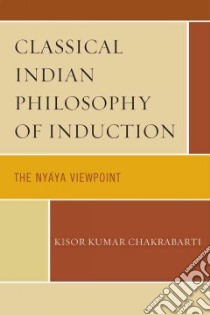Classical Indian Philosophy of Induction - 9780739122761
Un libro in lingua di Kisor Chakrabarti edito da Rowman & Littlefield Pub Inc, 2010
- € 82.90
- Il prezzo è variabile in funzione del cambio della valuta d’origine
"Kisor Kumar Chakrabarti demonstrates convincingly that Indian philosophical analyses of induction out-distance and often chronologically anticipate Western treatments. Furthermore, he shows that the problem of the justification of induction is more satisfactorily solved in Indian thought than in contemporary analytic philosophy."---Karl H. Potter, University of Washington.
"This is an erudite philosophical exploration of Nyaya logic and epistemology, with special attention to Nyaya theories of induction. This volume will be essential reading for anyone interested in classical Indian philosophy, and also for those who care about the continued vitality of the Nyaya school and the relevance of the Indian tradition to contemporary philosophical problems."---Jay Gatfield, Smith College; Central University of Tibetan Studies; University of Melbourne
Induction is a basic method of scientific and philosophical inquiry. Classical Indian Philosophy of Induction seeks to show, against the skeptical tide, that the method is secure and reliable. The problem of induction has been a hotly debated issue in modern and contempoarary philosophy since David Hume. However, Indian philosophers have been addressing this problem for about two thousand years---long before the modern era.
This volume examines some major Indian viewpoints, including those of Jayarasi (seventh century), Dharmakirti (seventh century), Prabhakara (eighth century), Udayana (eleventh century), and Prabhacandra (fourteenth century). It also discusses some influential contemporary positions, including those of Russell, Strawson, Popper, Reichenbach, Carnap, Goodman, and Quine. The main focus is on the Nyaya view developed by the Indian philosopher Gangesa (thirteenth century); a substantial part of the work is devoted to annotated translations of selected chapters from Gangesa's work dealing with the problem of induction, with copious references to the later Nyaya philosphers, including Raghunatha (fifteenth century), Mathuranatha (sixteenth century), Jagadisa (seventeenth century), and Gadadhara (seventeenth century). An annotated translation of selections from Sriharsa (twelfth century) of the Vedanta school, Probhacandra of the Jaina school, and Dharmakirti of the Buddhist school is also included. This book presents a solution to the classical problem of induction and the "grue paradox" based on the Nyaya perspective. The solution includes an argument from counterfactual reasoning, arguments in defense of causality, analyses of circularity and logical economy, arguments for objective universals, and an argument from belief-behavior contradiction.
Informazioni bibliografiche
- Titolo del Libro in lingua: Classical Indian Philosophy of Induction
- Sottotitolo: The Nyaya Viewpoint
- Lingua: English
- Autore: Kisor Chakrabarti
- Editore: Rowman & Littlefield Pub Inc
- Collana: (Hardcover)
- Data di Pubblicazione: 30 Gennaio '10
- Genere: PHILOSOPHY
- Argomenti : Induction (Logic) India History Nyaya
- Pagine: 311
- ISBN-10: 0739122762
- EAN-13: 9780739122761


